Liverpool’s entrepreneurial heritage has given rise to some of the UK’s most successful companies, spanning from billion-dollar discount retail empires to centuries-old shipping dynasties. This comprehensive analysis of Liverpool’s biggest companies reveals how the city’s strategic position as a major port and commercial centre has fostered businesses that have grown from local startups to national and international powerhouses, collectively employing tens of thousands and generating billions in annual revenue.
The Retail Revolution: Home Bargains Leads Liverpool’s Commercial Success
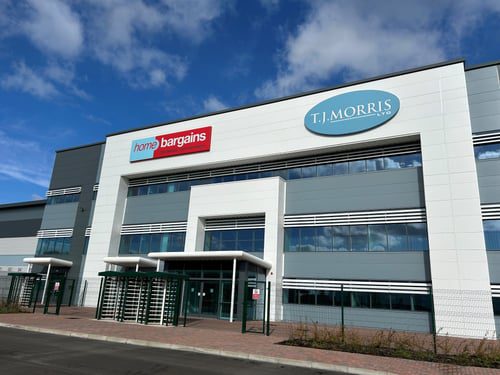
Home Bargains stands as Liverpool’s greatest modern commercial success story.
Founded in 1976 by Tom Morris at the age of 21 in Old Swan, the company has evolved from a single store called “Home and Bargain” into the UK’s largest discount retailer. The company’s remarkable growth trajectory reached new heights in 2024, with annual turnover increasing to £4.21 billion, representing a 11.7% rise from the previous year’s £3.767 billion. Operating profit soared by 34.2% to £434 million, demonstrating the efficiency of Morris’s business model.
Tom Morris, now worth $5 billion according to Forbes, has built this empire organically from humble beginnings using a bank overdraft. The company operates over 617 stores nationwide and employs 28,100 staff, making it the largest single employer in the Merseyside region. Home Bargains maintains its commitment to Liverpool, with headquarters remaining at the Axis Distribution Centre, which opened in 2008. The company’s expansion continues aggressively, with plans to reach 800-1,000 stores, opening new locations almost every weekend.
Morris owns 98% of TJ Morris, the parent company, while his younger brother, Joe Morris, serves as operations director and a minority shareholder. In 2024, Morris awarded himself dividends of £1.22 billion from the company’s profits, highlighting the extraordinary success of this Liverpool-born retail empire. The business model focuses on selling branded goods at discounted prices, with 70% of regular lines and 30% of opportunistic purchases, achieving remarkable profit margins of around 9% – far above those of mainstream supermarkets.
Bibby Line Group: Over Two Centuries of Maritime Heritage
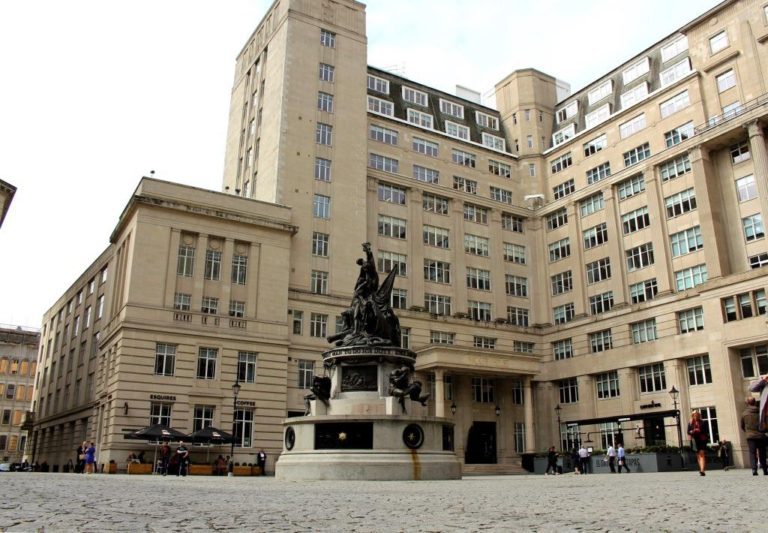
Bibby Line Group represents one of Liverpool’s oldest and most enduring business success stories. Founded in 1807 by John Bibby as a shipping company, it predates even Liverpool’s famous docks and has remained in continuous operation for over 217 years. The company has evolved from its maritime origins into a diversified global business now generating £268 million in annual turnover and employing around 1,300 people across 14 countries.
For the fiscal year ending December 31, 2024, Bibby Line Group recorded impressive financial performance with profit before tax reaching £12.8 million, a substantial 64% increase from £7.8 million in 2023. This growth was primarily driven by the outstanding performance of Bibby Marine, which saw revenues surge to £36.8 million from £21.1 million, transforming from a £4 million pre-tax loss to a £4.1 million profit.
The company operates across three core divisions: Bibby Financial Services (£188.6 million turnover), Bibby Marine (£36.8 million), and the Garic infrastructure business (£42.8 million). Bibby Marine is pioneering innovation with the world’s first zero-emission electric Commissioning Service Operations Vessel (eCSOV), backed by £20 million in UK Government funding. The company maintains its headquarters at Liverpool’s Exchange Flags, demonstrating the Bibby family’s continued commitment to their Liverpool roots.
Boodles: Liverpool’s Luxury Jewellery Legacy
Boodles exemplifies Liverpool’s heritage in luxury goods, tracing its origins to 1798 when the Kirk family established a jewellery business during Liverpool’s golden age, when the city was one of the world’s wealthiest. The company’s story is intertwined with that of the Wainwright family, who have maintained ownership through six generations. They took control in the late 19th century, when Henry Wainwright managed Kirk & Co.’s Liverpool store from 1889.
The company’s recent financial performance demonstrates continued strength in the luxury market. For the year ending February 29, 2024, Boodles reported annual sales of £104.9 million with pre-tax profits of £18.1 million. Despite a slight 1.3% dip in sales from the previous year’s £106.4 million, the company distributed £7.9 million in dividends to the controlling Wainwright and Amos families.
Boodles operates ten luxury showrooms, including its flagship store at the corner of North John Street and Lord Street in Liverpool—the same location it has occupied since the early 20th century. The company employs over 130 people and maintains an estimated net worth of £54 million. Leadership changes in 2024 saw Jody Wainwright and James Amos appointed as joint managing directors, with Michael Wainwright becoming chairman and Nicholas Wainwright assuming the role of president. Notably, Honour Wainwright became the first female family member to join the company in its 226-year history, assuming oversight of the marketing department.
The Digital Commerce Evolution: The Very Group’s Transformation
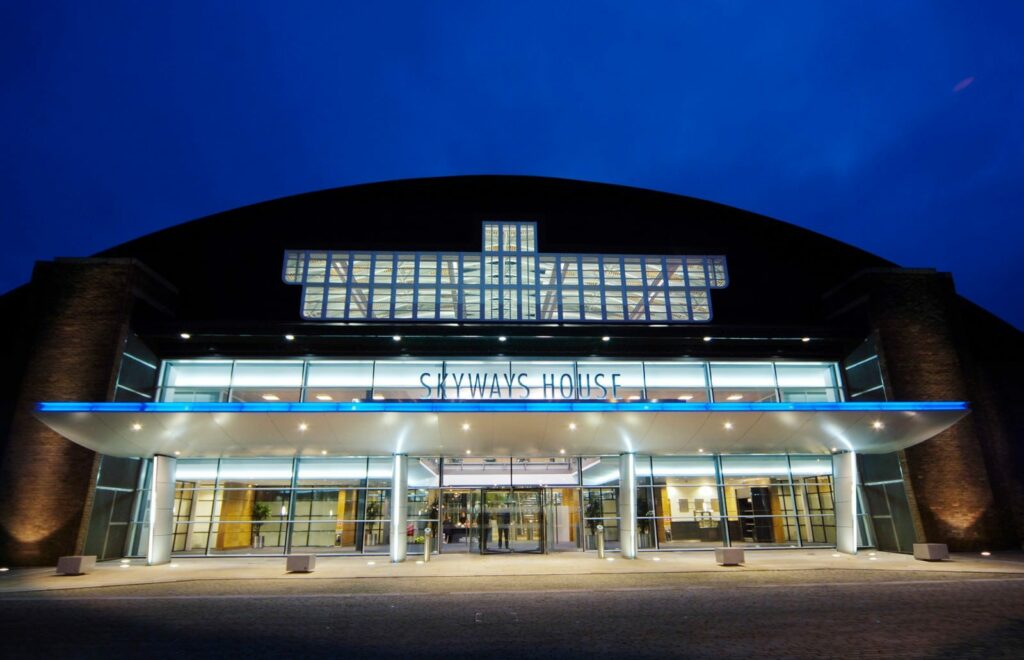
The Very Group represents the modern evolution of Liverpool’s retail heritage, with its headquarters in Speke and roots dating back to the 2005 merger of Littlewoods and Shop Direct. The Littlewoods component holds particular significance as it was founded by Sir John Moores in Liverpool in 1923, starting as a football pools business before expanding into mail order and retail, eventually becoming Europe’s largest private company by the 1980s.
The Very Group now operates as one of the UK’s largest online retailers with an annual revenue of £2.13 billion in 2024. Despite challenging market conditions, the company demonstrated operational efficiency with EBITDA growing 8.4% to £267.6 million and pre-exceptional operating profit jumping 17.1% to £218.3 million. The company achieved its lowest-ever operating costs as a percentage of revenue at 23.2%, showcasing effective cost management during difficult economic periods.
The company manages popular brands, including Very.co.uk and Littlewoods.com, while also operating Very Finance, which offers flexible payment options for customers. Recent half-year results showed a return to profit with £6.1 million pre-tax profit for the six months to December 28, 2024, reversing a £2 million loss from the same period in 2023. The company employs approximately 10,000 people and maintains a substantial technological infrastructure that supports its digital-first approach.
Out-of-Town Retail Innovation: Matalan’s Warehouse Revolution
Matalan pioneered the out-of-town warehouse-style retail model in the UK, founded in 1985 by John Hargreaves and headquartered in Knowsley, Merseyside. The company was inspired by American concepts, such as Sam’s Club, initially operating as a membership-only cash-and-carry business before transitioning to open retail. Matalan’s growth was extraordinary, with turnover expanding from £26 million in 1992 to £800 million by 1998.
The company faced significant challenges in recent years, with founder John Hargreaves losing control in January 2023 when lenders Invesco, Man GLG, Napier Park, and Tresidor took over the business to secure its future. The deal reduced Matalan’s gross debt by £260 million to £335 million while injecting up to £100 million in new funding. Despite these challenges, new owners are forecasting a doubling of annual EBITDA to £60-65 million for 2024, compared to £30.6 million in 2023.
Matalan operates 230 stores across the UK and moved its headquarters to a purpose-built facility in Knowsley in 2014. The building was sold for £25 million in 2020 in a sale-and-leaseback arrangement, though operations continue at the site. The company employs over 10,000 people and has developed a four-year business plan estimating revenue growth from £1.199 billion in 2023 to £1.444 billion by 2027.
Century-Long Retail Heritage: TJ Hughes’ Resilience
TJ Hughes represents another significant piece of Liverpool’s retail heritage, founded by Thomas John Hughes in 1912 on Liverpool’s London Road after completing an apprenticeship with department store Owen Owen. The business began modestly but grew under Owen Owen’s partnership from 1925, eventually expanding into a full department store operation.
Despite facing significant challenges, including administration in 2011, TJ Hughes continues to operate under the ownership of LHR Holding, controlled by the Juneja family, who rescued the business. The company now trades from 16 stores, including its Liverpool flagship, which relocated from its historic London Road location to Church Street in 2023. Recent financial performance shows sales of £25.7 million for 2024, down from £26.6 million in 2023, with pre-tax profits falling from £139,294 to £50,751.
The company employs approximately 370 people and maintains control of another famous Liverpool retail name, Lewis’s, which operates as a range of kitchen and homeware products within TJ Hughes stores. Director Anil Juneja remains optimistic about expansion opportunities, noting that two new stores are set to open in 2024 as part of the continued growth plans.
Global Manufacturing Presence: Unilever’s Port Sunlight Legacy
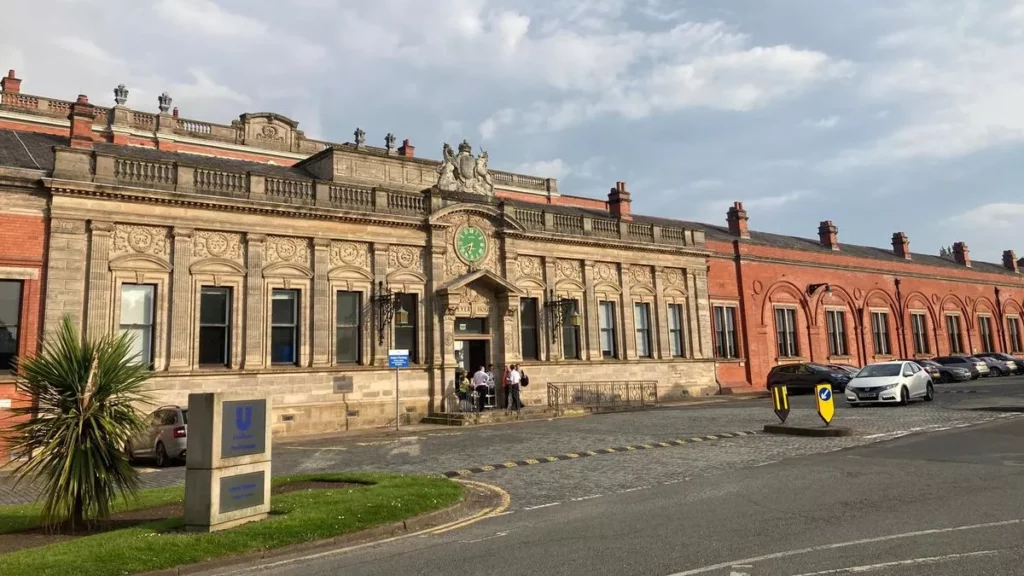
Unilever’s significant presence in Liverpool dates back to William Lever’s establishment of Port Sunlight in 1887, which created both a soap factory and a model village for its workers. The Port Sunlight facility represents over 130 years of continuous manufacturing in the Liverpool area, making it one of the region’s most enduring industrial operations.
The Port Sunlight site remains crucial to Unilever’s UK operations, housing the company’s main research and development laboratory and continuing to produce major brands including Dove, Persil, and Comfort. Unilever employs over 6,000 people across the UK, with significant operations remaining at Port Sunlight, supported by three of Unilever’s global R&D hubs, including the historic Port Sunlight research centre.
In 2017, Unilever opened a £24 million Advanced Manufacturing Centre at Port Sunlight, demonstrating continued investment in the Liverpool area. The UK operations generate nearly £2 billion in annual turnover, with around 70% of products manufactured by Unilever in the UK being sold domestically. The Port Sunlight village itself comprises 900 Grade II listed buildings and was designated a conservation area in 1978, thereby preserving Lever’s vision for the welfare of its workers.
Liverpool’s Economic Impact and Future Prospects
Liverpool’s major companies collectively demonstrate the city’s remarkable ability to nurture businesses from local startups to international corporations. The Liverpool City Region produces £33 billion of GVA annually, representing 2% of national GVA, with Liverpool itself contributing 39% of regional jobs and 40% of GVA. The city employs 294,788 individuals, representing a 10.61% growth in employment, which highlights a dynamic job market.
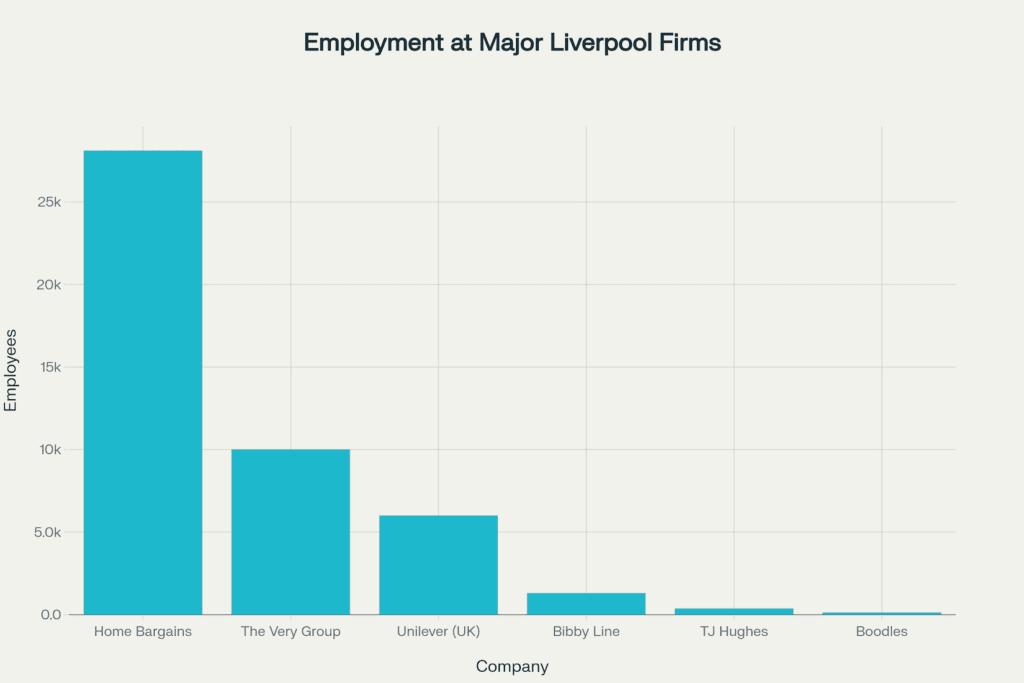
These Liverpool-born companies span diverse sectors, including retail, shipping, luxury goods, and digital commerce, reflecting the city’s entrepreneurial heritage and strategic commercial position. From Tom Morris’s £5 billion empire built from a single discount store to Bibby Line Group’s 217-year journey from shipping to diversified global operations, Liverpool has consistently produced entrepreneurs and businesses that have shaped British commerce.
The combined economic impact is substantial: Home Bargains alone employs over 28,000 people with an annual revenue of £4.2 billion, while The Very Group contributes £2.1 billion, Bibby Line Group £268 million, and other major employers add hundreds of millions more. These companies maintain their Liverpool headquarters and continue expanding, reinforcing the city’s position as a significant economic force in the UK.
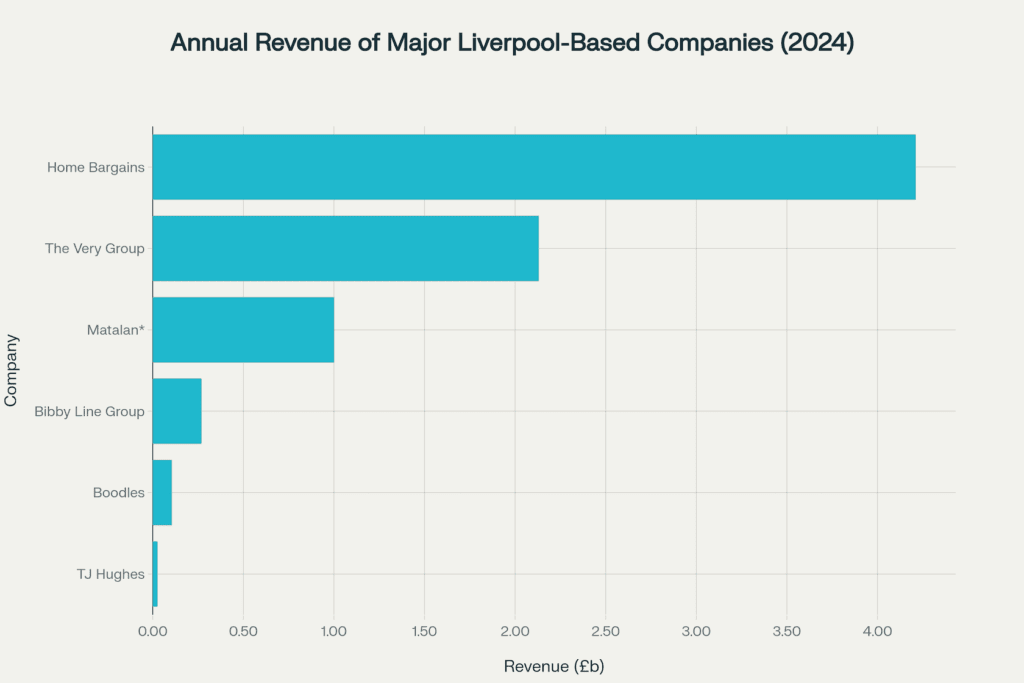
The city’s strategic location, trading heritage, and entrepreneurial culture have created an environment where businesses not only start but grow to become household names across the UK and beyond. Today’s employment landscape shows particular strength in wholesale/retail trade (5,451 companies), construction (4,480), and professional activities (4,444), with emerging growth in mobile apps, internet platforms, and analytics tools reflecting Liverpool’s increasing focus on digital industries.
Liverpool’s business legacy continues to evolve, with these established giants maintaining their growth trajectories while new sectors emerge, ensuring the city’s commercial prominence endures into the future.
